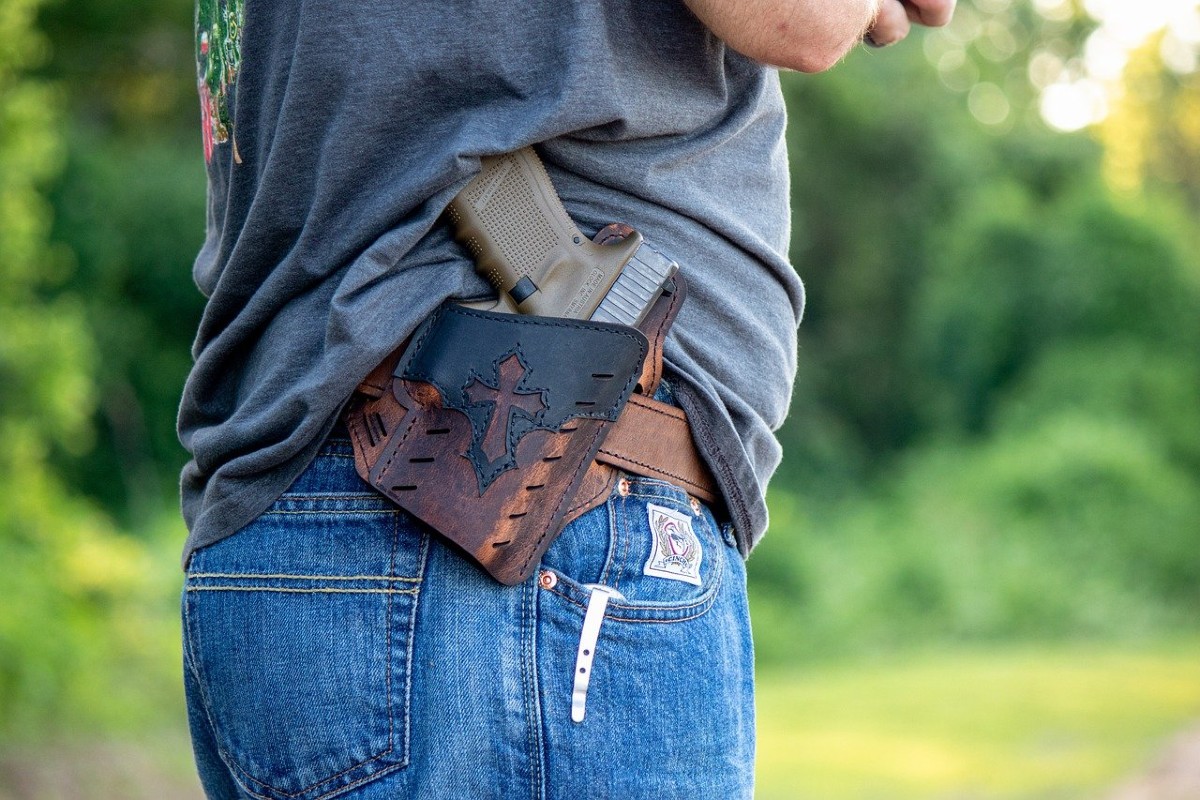
By Andy Brack, editor and publisher | Opponents of a measure that would allow handgun owners to carry their weapons in the open are relying on the state Senate to stop it in its tracks.
But the bill’s sponsor says an enlarged Republican majority in the state Senate may push the proposal toward ultimate passage after it gets through the S.C. House. Critics say the bill isn’t needed and has no general public benefit because there’s already a state process for citizens to carry concealed guns if they have required training.
Earlier this week, a House Judiciary subcommittee passed H. 3094, the open carry bill which requires training, on a 3-1 vote. In two weeks, the full Judiciary Committee is expected to approve the measure, which is cosponsored by more than half of S.C. House members. Passage by the full House is expected within a month, when it then would go to the state Senate, which picked up three GOP seats in the 2020 elections. Republicans now hold 30 of the Senate’s 46 seats.

“[With] the overall dynamic of the legislature with the increase of the Republican majority, there’s almost a mandate — an expectation — to pass conservative agenda items like the heartbeat bill and expanding Second Amendment freedoms,” said the open carry bill’s sponsor, Rep. Bobby Cox, a Greenville Republican who is a vice president of handgun manufacturer Sig Sauer.
“In talking with Leader [Shane] Massey in the Senate, they do like the bill as it is right now — open carry with training. It’s just a matter of timing.”
Opponents say open carry bill is dangerous
During subcommittee testimony and in interviews this week, opponents cautioned that the open carry proposal was dangerous to a society already smarting from the civil unrest of the Jan. 6 mob insurrection at the U.S. Capitol.
![]() Passing open carry right now is like adding fuel to the fire,” said Meghan Alexander, founder of Arm-in-Arm , a South Carolina advocacy group filled with gun owners who want to reduce gun violence. It got started in 2015, shortly after the massacre of nine worshippers at Emanuel AME Church in Charleston.
Passing open carry right now is like adding fuel to the fire,” said Meghan Alexander, founder of Arm-in-Arm , a South Carolina advocacy group filled with gun owners who want to reduce gun violence. It got started in 2015, shortly after the massacre of nine worshippers at Emanuel AME Church in Charleston.
“It puts strain on law enforcement already struggling with rising violent crime, on business owners already feeling economic strain, on hospitals struggling with COVID and on the first generation of kids who grew up with shooter drills like mine,” said Alexander, a Mount Pleasant resident. (Read Arm-in-Arm’s statement on open carry.)
What’s most worrying, she added, is how open carry would create an environment where the solution to disagreements could be in a gun on someone’s hip, she said, adding, “Law enforcement and medical folks are saying, ‘Do not do this, because it will cause more injury, more death.’”

Charleston Police Chief Luther Reynolds told Statehouse Report the open carry legislation was weaker than similar laws in other states because it does not preclude gun owners from carrying pistols in the open at protests, parades and events.
“They’re expanding this very quickly and, I think without a lot of thought and discussion,” Reynolds said.
Cox fired back he believed the measure would improve safety.
“Open carry with training would allow citizens to respond when police weren’t able to respond during calls or weren’t able to respond as we saw during the protests this past summer in Charleston,” he said.
Bill opponent Dean Foster of Meggett, who has worked with Arm-in-Arm, provided testimony at this week’s hearing on why the open carry measure was troublesome.
“South Carolina is already among the nation’s worst states for gun violence and, as of 2017, is ranked 12th nationally for per-capita gun deaths,” he said. “This creates enormous socio-economic costs for S.C. taxpayers. Research shows states that allow open carry endure the worst rates of gun violence. We should work on policies to reduce S.C.’s rate of gun violence, not make it worse.”
Reynolds added the proposal could also hurt South Carolina’s $19 billion tourism economy.
“We want to attract people to where they feel safe,” Reynolds said. “Do you think that [open carry] is going to attract tourists? I’m a pro-Second Amendment guy. But it’s about balance, what’s in the best interest of our city, what’s in the best interest of public safety and public good. This doesn’t do that. … With our residents and our economy, this is not going to be a net positive.”
Cox said he understood such arguments and backed police, in general, but 45 other states had open carry laws.
“We are not reinventing the wheel and they [police] need to adapt to this mission if this bill passes,” he said. He added he would continue to support efforts for so-called constitutional carry, which would allow open carry without training.
What you can do
Alexander said citizens needed to let state lawmakers know where they stood on the open carry proposal.
First, they need to contact them by email, phone call or U.S. mail, she suggested.
Second, they should reach out to the state’s municipalities to get them to pressure state legislature to thwart the bill. “Local municipalities are going to have very little recourse one this passes,” Alexander said. “Home rule is something to consider, but why not reach out now?”
She also encouraged citizens to write letters to the editor to share their thoughts on the open carry bill.
- Have a comment? Send to: feedback@statehousereport.com. Make sure to add your name and contact information for verification.















 We Can Do Better, South Carolina!
We Can Do Better, South Carolina!
I do have a cwp and it should be everyone’s individual choice to conceal their weapon or not! Their are circumstances where seeing a person openly carrying a weapon could stop crime before it occurred a criminal is less likely to do something in the presence of a person with a weapon!